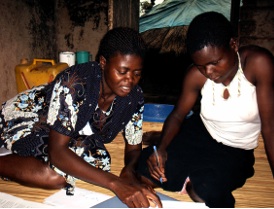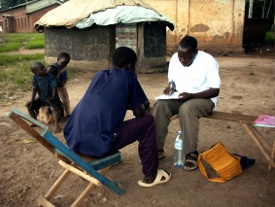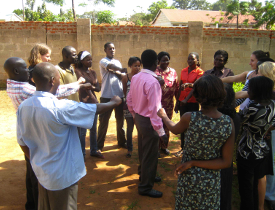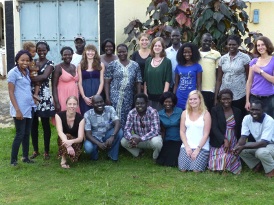Since April 2011 the vivo outpatient clinic in Gulu, Northern Uganda is a steady service provider for the rehabilitation of chronic trauma-related mental health problems of survivors of violence and trauma during the war and in the post-conflict society.

Former child soldiers, who were forcefully abducted to live with the rebels in the bush, to fight for them and to kill for them, often for months up to years, are among the most severely affected. Despite the fact that the fighting ended in 2005, many survivors cannot forget their experiences and continuously relive them in the form of intruding memories, nightmares and flashbacks. For them, the war continues in their minds and impairs their daily life with their families, at work, in school. Nowadays almost all former child soldiers have grown up to be (young) adults, of whom is expected to be productive members of their families and of society.
Today we want to give an overview of the achievements of our 14 trauma counsellors working in the outpatient clinic – numbers and facts:
Since April 2011 the outpatient clinic in cooperation with research projects of the Universities of Konstanz and Ulm in Germany has served 561 clients with trauma-specific treatment, of which 548 received a diagnostic interview in order to assess the extent of the experienced violence and its resulting mental health problems. At the time of the interview our clients were on average 32 years old – the youngest being 13 years old and the oldest one 87 years. 78% of these clients are formerly abducted by the LRA, who often had been abducted when they were still children and forced to become child soldiers. Our clients’ abduction times were of variable length – lasting from one hour up to 16 years, with an average of 2 years and 5 months.
45% of the interviewed clients suffer from a Posttraumatic Stress Disorder, the most common trauma-related mental health problem, which is characterised by the re-occurring of the traumatic event(s) through intrusive images, thoughts, feelings, nightmares and flashbacks resulting also to an impairment in every day life. Our numbers are higher than in the general population, because the majority of our clients is formerly abducted and thus having a higher load of traumatic stress.
Almost all (94%) were treated with Narrative Exposure Therapy. The 14 vivo counsellors at any time point treat two clients in individual sessions, which they schedule twice a week over a time period of approximately 6 to 8 weeks. The therapy sessions either take place in the counselling rooms within the outpatient clinic or in the huts of the clients, since the clients do not have the means of transport when living in remote areas.
Up to this point 83% received a follow-up assessment after 4 and 8 to 10 months in order to monitor the short- and long-term changes of the trauma-related psychological symptoms. Of this group 80% did not fulfill the diagnosis of Posttraumatic Stress Disorder anymore. 20% of the clients, who still report clinical significant trauma-related symptoms, continue to receive further counselling, for different reasons: newly experienced traumatic events, events of the past that were not yet disclosed due to feelings of guilt and shame, on-going domestic violence, alcohol misuse.
Suicidality frequently co-occurs with trauma-related psychological symptoms. A high risk for suicidality is always immediately addressed by our counsellors through suicidal intervention. The intervention shows a 100% success rate in the reduction of the suicidal risk.
Additionally our counsellors also worked with 214 inmates of the Gulu Prison with general counselling sessions for everyday worries and problems due to the special situation of being imprisoned.
Thus, in total the vivo outpatient clinic worked with 775 clients and our trained local vivo counsellors accomplished a valuable and unique task, which is not only quantitatively but also qualitatively impressive: with their steady work with clients they show highest empathy and a high level of professionalism through supporting the client in remembering negative emotional past events, to confront them though narrating and thus help the clients to process them. Furthermore they are always eager to learn more in further trainings and show a high interest for their work, the well-being of their client beyond the trauma-specific treatment and they support each other as co-counsellors in a team. For that all vivo members wish to say a big thank you and highest praises.




